Monthly Archives: November 2018
End of November 1918
Longing for Home and Recovering From Frostbite
All material produced or reproduced here and throughout this work is the sole copyright of the author and the family of Doctor D.C.M. Page MC.
“During the next few days I recuperated. The hospital wasn’t in working order yet, so that there was no work for the large staff of Medical Officers loafing about here. I wish they’d send me home! I had one or two trips into Archangel, where I met many old acquaintances. I also paid a visit to the Hospital Ship ‘Kalyan’, which is lying frozen in alongside the quay at Archangel. She is to remain here all winter. It was a treat to see and talk to a British woman again. The evenings were spent in playing bridge and vingt-et-un.”
The card game vingt-et-un is of course known these days by the names “Twenty one”, “Pontoon” or “Black Jack”.
HMHS Kalyan
Kalyan was one of a series of six small ships ordered by P&O in 1914. She was laid down and built by the Cammell Laird Company in 1915 at their yard in Birkenhead. All six had names that began with K and were named after places in India. Originally entering service as a troop ship, Kalyan was refitted as a hospital ship during 1918 and able to provide accommodation for over 750 patients. One of the “Improvements” noted in the ship’s diary was that of a wire cage forming a segregated area to contain patients suffering from mental disorders. This was described as “very satisfactory”.
From around this time in 1918 Kalyan would become iced-in on the River Dwina and would remain so until late spring in 1919. Each day the ice around the ship would be hacked away to prevent crushing of the hull.
Following the war Kalyan remained in service with P&O until 1932 when she was sold to a Japanese salvage company. Rated at 9118 tons she was broken up for scrap in Japan during 1933.
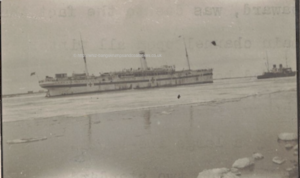
HMHS Kalyan on the River Dwina preceded by an Ice-breaker.
(Picture from the diary all rights reserved)
Find out about our connection with Dr Page and an introduction to his diary here
25th November 1918 Monday
French Ski Troops Catch a Teddy Bear
All material produced or reproduced here and throughout this work is the sole copyright of the author and the family of Doctor D.C.M. Page MC.
“I had breakfast at 82 C.C.S., and then hung about on the quay at Archangel Pristim waiting for a boat to take me across to Archangel. It was an intensely cold day – some 40 degrees of frost – with a clear blue sky and a biting wind. The ground, of course, was covered deeply with snow, and the Dwina was almost frozen over. My feet soon got like lumps of lead, and when I at length reached 85 General Hospital at Solombola, I could hardly get my boots off. Several of my toes were frost-bitten, and were very painful for days after. Some French Alpine Chausseurs appeared with a young ‘Teddy’ bear which they had caught in the forest. It caused great amusement with its funny antics. The boat, an ice-breaker – arrived about 2.30 p.m. and it was with great difficulty that I got aboard with all my kit. I met Evans, the Sanitary Officer on board, who on reaching the other side, took me up to his mess, and gave me a ‘high’ tea, which saved my life. I reached 85 General Hospital about 6 p.m. just about dead beat. Thus ended the second part of my Russian adventure.”
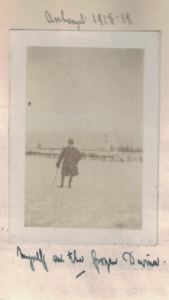
Myself on the frozen Dwina
Find out about our connection with Dr Page and an introduction to his diary here
24th November 1918 Sunday
A.D.M.S. Sacked! General Ironside Brings Good News for Douglas
All material produced or reproduced here and throughout this work is the sole copyright of the author and the family of Doctor D.C.M. Page MC.
“On Sunday 24th General Ironside, commanding the N.R.E.F. came up, and I had a long interview with him. He was most sympathetic, and told me, on the quiet, that the A.D.M.S. was being sent home – incompetent. This was a piece of good news to me. I spent the day in saying farewell to all my many friends at Obozerskaya, and finished up at the Flying Corps Mess, where I had a rousing reception. I left by the 11.30 p.m. train and travelled very slowly all night, eventually reaching Bakharitza about 7 next morning.”
Find out about our connection with Dr Page and an introduction to his diary here
23rd November 1918 Saturday
Relief at Last
All material produced or reproduced here and throughout this work is the sole copyright of the author and the family of Doctor D.C.M. Page MC.
“On Saturday 23rdNov. Capt. Harrison came up from 82 C.C.S. to take my place up here. I was never so glad to see anyone in all my life before! I had a busy day or two handing over to him, and putting him wise about all things.”
Find out about our connection with Dr Page and an introduction to his diary here
21st-22nd November 1918 Thursday and Friday
Allies Betrayed by American Thefts
All material produced or reproduced here and throughout this work is the sole copyright of the author and the family of Doctor D.C.M. Page MC.
“During the next few days the weather became much colder, and on the 21stNov. 22½ degrees of frost were registered. The air was beautifully clear, however, and one soon got accustomed to the intense cold. Winter kit arrived to be issued to the men. This consisted of fur caps, leather jerkins, large leather coats lined with sheepskin, fingerless gloves, thick stockings, and the special Shackleton boots to prevent frostbite.
About this time, too, the A.S.C. stores at Obozerskaya were being continually broken into at night, and the goods therein pilfered. Rum, whisky, port etc. were the goods usually stolen, although many sacks of flour, and cases of jam etc. went missing. These thefts were eventually traced to the American sentries, who were supposed to guard the place at night! They were even caught fraternising with the Bolos at night, and selling the stolen goods at a high price. What noble Allies we have! My room was broken into too, and several personal articles and some medical stores stolen. Even the ambulance train was not immune for several mattresses and bolsters were removed at night from one of the cars.”
Find out about our connection with Dr Page and an introduction to his diary here
19th November 1918 Tuesday
мы поздравляем вас (We congratulate you)
All material produced or reproduced here and throughout this work is the sole copyright of the author and the family of Doctor D.C.M. Page MC.
“On Tuesday 19th I was present at a very interesting ceremony at H.Q. Mess. The three head foresters had come over to congratulate Col. Lucas on the success of the Allies in France and elsewhere. They were gorgeously arrayed in full-dress uniforms with small silver daggers at their sides, and many brilliant decorations on their breasts.
Speeches were made, and the healths of Russia and the Allies were drunk in port.”
Find out about our connection with Dr Page and an introduction to his diary here
18th November 1918 Monday
Shell Shock from a Pistol Shot?
All material produced or reproduced here and throughout this work is the sole copyright of the author and the family of Doctor D.C.M. Page MC.
“The next day the A.D.M.S. wired me to send Capt. Jones forward to Verst 455 to relieve the American doctor, who had developed ‘shell-shock’ when somebody fired a Verey pistol one night!”
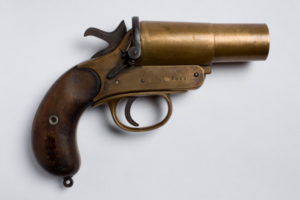
A 1916 Pistol, 1976_448 Photo from Black Country Museums via CC https://www.flickr.com/photos/blackcountrymuseums/4882055850
The Verey pistol (also Very) was named after its American inventor Edward Wilson Very who was a naval officer. Although his name was spelled without an ‘e’ both spellings are used for his invention.
It wasn’t a weapon but was used for firing warning flares and also used to light up an area like no man’s land or enemy trenches.
It has on occasions been used as a weapon and at close range it was a formidable one, similar to having a firework shot at you at high velocity.
Shell shock in the modern day is more commonly known as post-traumatic stress disorder (PTSD). It was first written about in The Lancet in 1915 by Charles Myers consultant psychologist with the British Army. In theory however throughout most of the war the British Army merely looked on shell shock as lack of moral fibre, cowardice or just plain shirking.
Find out about our connection with Dr Page and an introduction to his diary here
17th November 1918 Sunday
Frustration and Conflict
All material produced or reproduced here and throughout this work is the sole copyright of the author and the family of Doctor D.C.M. Page MC.
“On Sunday, the 17th, Capt. Jones, the new M.O. Ambulance Train, and I went up the line on a tour of inspection. We did not go on an engine, but by special train. We went right forward to Verst 455, and found everything very quiet there. A company of the King’s Liverpool Regiment was holding the front position, which consisted of one or two Russian houses and three British-built blockhouses situated in a clearing in the dense forest. The railway ran through the clearing, and on through No Man’s Land towards Petrograd. One could see nothing of the Bolo. positions, as the railway took a bend just beyond our front post. I found no Medical Officer at Verst 455, but there were three – 2 Americans and 1 French – back at Verst 466, who all complained of having nothing to do. When I suggested to the Americans that one of them should be forward at Verst 455, they objected strongly, stating that the firing line was no place for a doctor, and that when British troops were forward a British doctor should be forward too.
I immediately reported the matter to the A.D.M.S., and at the same time sent in my resignation – or rather applied to be relieved of my present post (see Appendix D*).
I also interviewed Col. Lucas when I got back to Obozerskaya, who immediately sent orders up to Verst 466, for one of the American doctors to go forward to Verst 455 for duty.”
*(Appendix D will be published later in the diary)
The arrangements for chain of command with the North Russian Expeditionary Force were that the British would control the whole operation, so all other countries’ contributing armies would take orders from the British high command under General Ironside.
A common complaint from American personnel was that they objected to taking orders from the British officers whom they regarded as treating them badly and with disrespect, something that we will encounter later in the diary as the resentment turned to crime. The misunderstandings were probably as much due to the differences in culture as to any bad treatment although the problem was ingrained from the start under General Poole. Poole had an authoritarian style and ruled more like a colonial governor with a certain lack of sensitivity than might have been needed in such a situation. He had been recalled and replaced by Ironside with the intent of improving that situation.
Douglas had found it increasingly frustrating that the Americans were so reluctant to obey orders from him as although he was the Senior Medical Officer there wasn’t much he could do if a foreign military man refused orders. His frustration boiled over into a request to be relieved.
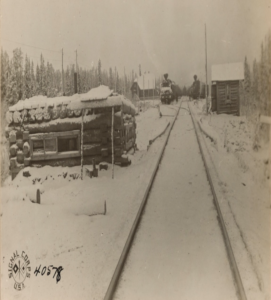
This picture taken on 15thNovember 1918 is of verst 455. The only name for this clearing in the forest complete with passing loops denoting that the position is 455 versts (a verst = appx 0.66 mile or 1.1 kms) from the original measuring point in the south. On the left is one of the 3 British built blockhouses. They were built from massive logs with walls about a metre thick to withstand enemy fire.
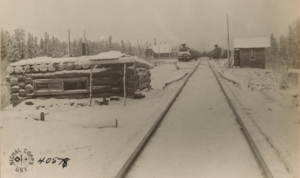
This is the original view which gives the impression of a broad gauge track. There is no evidence that the railway was built with anything other than the normal 5 ft “Russian Gauge” The Railway was begun in 1893 and completed by 1897 by which time gauging agreements would adhere to the 5ft track gauge.
Find out about our connection with Dr Page and an introduction to his diary here
14th November 1918 Thursday
The RAMC Relieve the Americans at the Hospital
All material produced or reproduced here and throughout this work is the sole copyright of the author and the family of Doctor D.C.M. Page MC.
“The train bringing the incoming party of R.A.M.C. men arrived at 2.30 on Thursday morning, the 14thNovember. It was snowing hard at the time, and I had a cold job getting them all sorted out, and settled down temporarily. They were from 82 C.C.S. and were under Capt. Kennifrick. Lt Woods, the quartermaster, came up with them to do the taking over, and I was glad that he came too. I found that they had left their rations and kit behind at Isako Gorka, but I phoned to the R.T.O. there, who sent it up at once by special engine.”
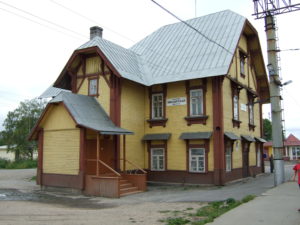
Modern view of Oboserskaya station. Photo by Paramecium via Creative Commons https://commons.wikimedia.org/wiki/File:Oboserskaja.jpg
Find out about our connection with Dr Page and an introduction to his diary here
13th November 1918 Wednesday
An Obnoxious Pile
All material produced or reproduced here and throughout this work is the sole copyright of the author and the family of Doctor D.C.M. Page MC.
“On Wednesday 13thNovember, I received a wire from the A.D.M.S. which was as follows:- ‘One officer, fourteen other ranks R.A.M.C. proceed evening train 13thObozerskaya area. They will take over charge detention hospital Obozerskaya.’ I was astounded when I read this, and so was Capt. Rosenfeldt, for there was nothing said about what was to be done with Rosenfeldt and his men, at present running the hospital. Still, I thought that sooner or later the A.D.M.S. would make a change, as the hospital was in such a filthy state, and was so badly run by Rosenfeldt. I immediately wired off to the A.D.M.S as follows: ‘Please wire instructions as to disposal of American Ambulance unit here, Urgent.’ The A.D.M.S.’s reply to that wire was: ‘Use as ambulance not as detention hospital,’ which reply helped me such a lot! I had now to find accommodation somewhere for Rosenfeldt and his men and suggested to him that he should move into the school at the Forestry Village temporarily. This he refused to do without consulting his superior officer! (I thought I was that distinguished gentleman!) Then a Capt. Pile, a most obnoxious Yankee M.O. arrived on the scene, and gave orders to Capt. Rosenfeldt to repair to box cars which were standing empty on the line outside the hospital. There were no stoves in these cars, and as it was snowing heavily, and very cold, I tried to impress upon Capts. Pile, and Rosenfeldt the absurdity of putting men into them in such weather, when they had the chance of good billets indoors, but they wouldn’t listen to me. So into the box cars they went, and when both British and American H.Q. heard about this I got the blame for putting them into such a plight, but was able to clear myself satisfactorily. The whole thing was originally the fault of our A.D.M.S. for not first of all consulting with American Medical H.Q. as to the disposal of Rosenfeldt and party.”
Find out about our connection with Dr Page and an introduction to his diary here